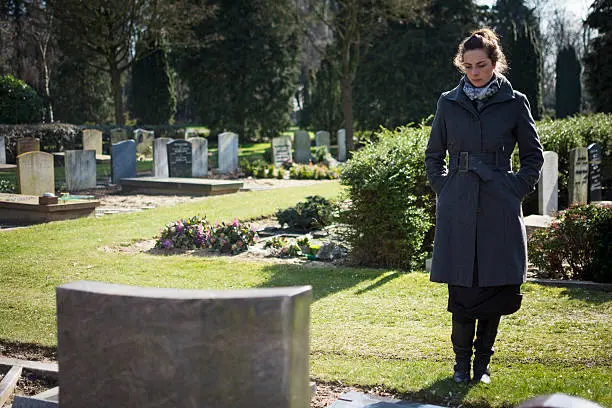The question of whether deceased loved ones are aware when someone visits their grave is an age-old one that touches on spiritual beliefs about the afterlife and consciousness after death. While there is no definitive scientific evidence to confirm that the dead have knowledge of the living’s activities, the notion persists and can bring comfort to people grieving a loss.
This article will explore beliefs, perspectives, and theories around the idea that the dead retain some connection and awareness of the living after passing, especially when people pay respects at their burial sites. The cultural history around ceremonial grave visitations will also be discussed.
What are some beliefs around the dead being aware of the living?
Many cultures and religious faiths have historically harbored beliefs that a soul or consciousness exists after biological death, and that the dead maintain bonds and awareness of some kind with regards to the living they knew in life. This is tied to concepts of an afterlife or ongoing spiritual existence after mortal death.
Some of the key beliefs include:
- Certain religions, such as Christianity, Islam, and Hinduism, preaching an eternal afterlife where the dead may be aware of the living and vice versa in some way.
- Mediums and psychics claiming to communicate with the dead, thereby implying an ongoing consciousness exists.
- Supernatural or ghostly visitations by the dead to the living in dreams or waking moments indicating they are aware.
- The idea in some Eastern religions of reincarnation – that a soul takes on new life and maintains some essence of who they were previously.
Why do people feel compelled to visit graves?
There are a few key reasons why visiting graves of loved ones is considered important among many cultures:
- To pay respects and remember the dead with a sense that their soul or spirit may be observing the act.
- To feel a connection with ancestors and be reminded of one’s heritage and family bonds.
- To grieve and achieve closure after a difficult loss. The grave site offers a tangible place to connect with the deceased.
- Out of religious obligation and ceremonial custom – many faiths have rituals around grave connections.
Theories on how the dead could retain awareness of the living
While no solid scientific evidence confirms consciousness after death, some theoretical explanations for how a soul or essence of a person may persist include:
Quantum theory – The idea that consciousness arises from quantum processes which can survive beyond the body.
Universal consciousness – A collective cosmic consciousness all share, allowing some essence of awareness to continue.
Psychic or supernatural theories – Notions of paranormal phenomena, extrasensory perception, and supernatural properties allowing connections beyond physical death.
Higher dimensions – Concepts in quantum physics of possible higher spatial dimensions into which consciousness could transition.
Of course, all these remain speculative ideas that the comforted living may choose to believe to assuage the pain of loss. But they offer interesting possibilities.
Cultural traditions and ceremonies centred on grave visits
Visiting graves as an act of ceremony and remembrance occurs globally across most cultures. Some examples include:
The Obon festival in Japan sees millions visit ancestral graves to welcome the spirits of the dead and perform rituals which feed and entertain them with dances, lanterns, and offerings.
The Day of the Dead in Latin America sees families gathering at graves to feel the presence of lost loved ones with rituals meant to honor and pay respect to the dead.
Qingming festival in China allows people to tend to ancestral graves, make offerings, and communicate thoughts and memories to the deceased.
Pilgrimages to graves of Sufi saints in Islam, Catholic saints’ relics, and the tombs of gurus in India are thought to offer blessings and boons from the holy dead to the living visitors.
These are just a few examples of the cultural emphasis placed on connecting with dead loved ones through grave visitations.
Do visits really indicate awareness by the dead?
This is the central question – do departed souls actually observe and perceive when someone visits their grave? The answer depends very much on personal beliefs about the existence of a consciousness which endures beyond physical deterioration of the body and brain.
Some may insist that supernatural phenomena like ghosts and medium communications constitute proof. But without hard evidence, it remains an issue of faith and spirituality. The act of visiting a grave may reflect more the needs of the living than any awareness among the dead. Nonetheless, the ritual retains deep cultural meaning and personal significance for those dealing with loss.
And the persistence of beliefs in the sentience of the dead means that to many, visiting a grave is indeed powerfully felt as a moment of connecting with that person’s essence once more.
Why do some feel the dead are aware while others are skeptical?
There are a few key reasons why some readily believe their departed loved ones remain aware of them from beyond, while others reject the notion:
Personal beliefs – Faith, religion, psychic experiences, and personal convictions about the supernatural or afterlife color perceptions.
Emotional needs – Needing reassurance that a loved one who died still cares can drive belief.
Lack of proof – The skeptics require evidence before accepting such claims.
Comfort in belief – Some don’t need proof and feel believing the dead are aware brings peace of mind.
Scientific attitudes – Strict materialists adhere only to what is physically provable.
So differences boil down to personal versus scientific perspectives, emotional needs versus doctrinal teachings, psychic sensibilities rather than skepticism about life after death.
Believers and doubters likely won’t shift their positions easily. But the possibility however slim still tugs at those mourning their departed.
Do the Dead Know When You Visit Their Grave
The question of whether deceased loved ones are aware when someone visits their grave touches on profound issues around the possibility of consciousness after death. Cultural and religious perspectives on this have varied greatly, though the notion persists across faiths that the dead retain bonds with the living.
For those grieving a loss, the act of visiting graves and sensing a connection can carry deep emotional resonance and meaning. Ultimately, it remains an issue of belief and personal experience rather than definitive proof. The comfort derived itself brings solace to many grappling with mortality.
Does the Dead Know When You Visit Their Grave – Islamic Perspective
In Islam, it is believed the dead can hear and recognize visitors at their grave and there are teachings around this in the hadiths. Muslims often whisper prayers and greetings to the dead when visiting graves. Stories abound of the dead responding, with the grave seeming to physically expand or contract.
The concept of an ongoing awareness and even the notion of the dead being questioned in the grave features prominently in Islamic eschatology around barzakh – the intermediate realm between death and resurrection. The visits by the living could prepare one for answering the questioning by angels Munkar and Nakir.
Can the Dead Hear You in the Grave
Whether the dead can literally hear the living is debated across faiths and cultures. Skeptics deny the possibility due to the brain being dead. Believers argue for supernatural explanations that allow for consciousness and sensory perception after death. Visits to graves often involve talking aloud to the dead, suggesting an intuitive sense they can hear. Actual proof is elusive but the symbolic value itself brings comfort for many.
When Someone Dies Can They Come Back to See You
Concepts across religions of ghosts, spirits, the undead or even reincarnation suggest the possibility of the dead returning to the living in some form. Tales abound of supernatural encounters, hauntings, possessive spirits or bereaved relatives dreaming the dead return to see them. It remains speculative – but indicates a profound longing among the living for continuity beyond loss.
When Should You Visit A Grave
There are no fixed rules around appropriate times for grave visits. Those in acute grieving often go more frequently, as much as weekly or on anniversaries, seeking solace. Others may only go on religious holidays specifically meant for tending graves. It depends on culture, faith and individual needs. Grave visits also spike around Day of the Dead, Obon, Qingming, Easter, Chhath Puja and other such commemorative festivals.
What Does The Bible Say About Visiting The Grave
The Old Testament warns against consulting the dead via mediums. However visiting graves to mourn or show respect is not prohibited. Jesus visited Lazarus’ tomb, mourning before resurrecting him. On visiting graves, Ecclesiastes says the living should learn wisdom and contemplate their own mortality. The focus is on using such moments to reflect on living ethically, not occult practices.
How Often Should You Visit A Grave
There are no rules here – some visit graves obsessively in early bereavement, others on anniversaries or special occasions. It depends on culture and faith too. Muslims tend to visit frequently before Ramadan seeking blessings from the dead. Hindus may visit during Pitru Paksha to offer pind-daan. Catholics tend graves leading up to All Soul’s Day. The key is letting personal emotions and needs guide frequency, not imposed norms.
Does Visiting A Grave Help
It undoubtedly can, despite the lack of definitive proof around the dead sensing such visits. It provides symbolic closure and comfort for the grieving. The tangible ritual offers a still-continuing bond amid the pain of absence and loss. Talking to headstones is much like writing to the departed – it gives space to process grief. And the possibility the grave is a portal by which the dead remain aware brings huge solace.
Conclusion
The concept that loved ones who have passed away retain some form of awareness and connection with the living is a metaphysical notion that lies squarely in the realm of faith, beliefs and individual experience.
Without conclusive evidence, it remains an unprovable article of faith comforting for some and easily rejected by others on rational grounds. And yet for millennia people have clung to the hope that death is not the end. The persistence of grave visitations and their deep emotional resonance attests to this profound longing to transcend mortality.
Perhaps then, the question is not can it be irrefutably proven. But rather – is the possibility alone enough to sustain those seeking meaning and continuity with people they have lost. In the end, it is a matter not of hard fact but of personal truth.
The mystery of death’s curtain dividing the living from the departed continues to fascinate and confound. For those still grieving, the faint chance their loved one somehow senses their presence may be slim – but remains profoundly meaningful nonetheless.
FAQs
What happens when you visit a grave?
When visiting a grave, people often experience a range of emotions from sadness and grief to treasured memories and even a sense of peace or joy. Some talk aloud to the deceased, bring offerings, or sit in quiet contemplation. It can provide closure and comfort for the bereaved.
How do you know when a deceased loved one is near?
There’s no definitive way to confirm when a deceased loved one’s spirit is near, but believers report signs like sensing their presence, smells or sounds connected to them, electronic glitches, vivid dreams, animals reacting to something unseen, or meaningful symbols and events.
How long after someone dies can they communicate with you?
Views differ widely on how long after death contact might linger. Some think spirits communicate for the first year until crossing over fully. Others allow for ongoing communication years later through mediums or dreams. Much depends on one’s beliefs around the afterlife.
What do you call visiting someone’s grave?
Visiting a grave is often called “paying respects”, “tending a grave”, “graveside visitation”, or “making a pilgrimage to a grave”. The term emphasizes it being an act of ceremonial remembrance and honor for the deceased.




